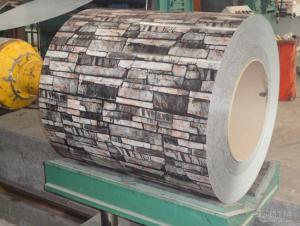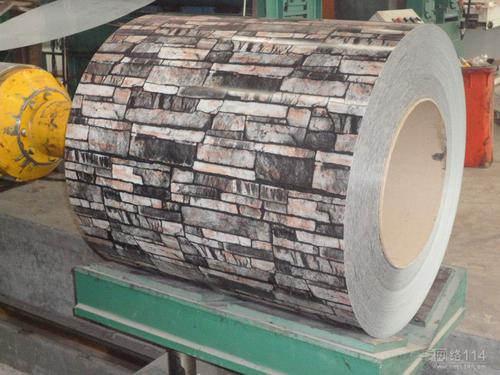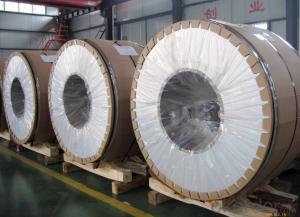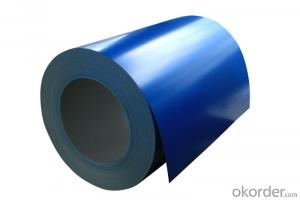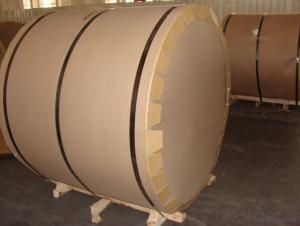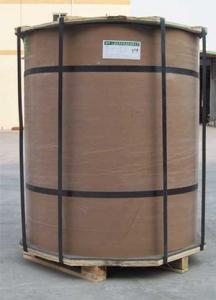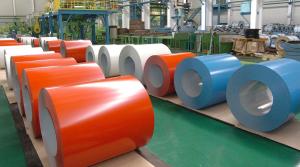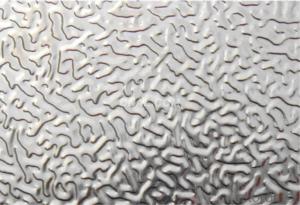Stucco Embossed 5xxx Series Coated Aluminum Coil
- Loading Port:
- China Main Port
- Payment Terms:
- TT OR LC
- Min Order Qty:
- -
- Supply Capability:
- -
OKorder Service Pledge
OKorder Financial Service
You Might Also Like
Product Description:
1 Specifications of PE Coated Aluminum Coil/Sheet
Alloy | AA1050,AA1060, AA1070, AA1100, AA3003, AA3004, AA3005, AA3105, AA5005, AA5052, AA5754, AA5083, AA8011 |
Temper: | H12, H14, H16, H18, H22, H24, H26, H32,HO, F |
Thickness: | 0.10-4.0mm |
Width: | 10mm- 2000mm |
Coating | PE(Polyester) |
Painting Thickness | Standard 16-25 microns, max 40 microns |
Color | Acording to Ral colors or customer’s samples |
Standard: | GB/T17748-1999, ASTM, ISO, EU standard |
Special Specification is available on customer’s requirement | |
Paint Material:PPGI,BECKER, NIPPON.
PE(polyester) Coating
PVDF
2 Usage/Applications of PE Coated Aluminum Coil/Sheet
Our company's PE Coated Aluminum Coil/Sheet have been widely used in the fields of construction and decoration(garage doors, ceiling etc.), electronic appliances, lighting decoration, air-condition air pipe, sanwich panels and drainage, etc.
- Q: Is it possible to utilize steel wires in the creation of jewelry or decorative items?
- <p>Yes, you can use steel wires for making jewelry or decorations. Steel wires are durable and can be shaped into various forms, making them suitable for a range of designs. They are often used in wire wrapping techniques and can be combined with beads or other materials. However, it's important to consider the type of steel used; stainless steel is more resistant to rust and is commonly preferred for jewelry making. Additionally, steel wires may require special tools for cutting and bending, and proper safety measures should be taken during the crafting process.</p>
- Q: What is the typical heat transfer coefficient for aluminum coils?
- The typical heat transfer coefficient for aluminum coils can vary depending on various factors such as the specific application, coil design, and operating conditions. However, a commonly observed range for the heat transfer coefficient of aluminum coils is around 50 to 250 W/m2K.
- Q: Are aluminum coils suitable for corrosion-resistant applications?
- Yes, aluminum coils are suitable for corrosion-resistant applications. Aluminum has a natural oxide layer that forms on its surface, which provides excellent corrosion resistance. This oxide layer acts as a barrier, protecting the underlying aluminum from corrosion caused by moisture, chemicals, and other environmental factors. Additionally, aluminum can be further enhanced with various coatings or treatments to improve its corrosion resistance even more. Therefore, aluminum coils are commonly used in applications where resistance to corrosion is crucial, such as in the construction industry, automotive industry, and marine applications.
- Q: Is it possible to utilize aluminum coils in the automotive industry?
- <p>Yes, aluminum coils are widely used in the automotive industry. They are employed in various applications such as engine parts, heat exchangers, and body panels due to their lightweight, corrosion resistance, and high strength-to-weight ratio. Aluminum's recyclability and energy efficiency in production also contribute to its popularity in vehicle manufacturing.</p>
- Q: What are the common fabrication techniques for aluminum coils?
- The common fabrication techniques for aluminum coils include hot rolling, cold rolling, annealing, slitting, and coating.
- Q: Can aluminum coils be used for automotive heat shields?
- Yes, aluminum coils can be used for automotive heat shields. Aluminum is a commonly used material for heat shields due to its excellent thermal conductivity and high melting point. It is lightweight and has good corrosion resistance, making it ideal for automotive applications. Aluminum coils can be easily formed into the desired shape and provide effective heat insulation, protecting sensitive components from excessive heat generated by the engine or exhaust system. Additionally, aluminum is cost-effective and readily available, making it a popular choice for automotive heat shields.
- Q: I know that Aluminum is a metal, and it's corrosive, but I've been wondering about how Aluminum Foil is created. Is it the same as the metal? Just pounded down? or is it a mixture of different elements?
- It is made by rolling an aluminum block thinner and thinner. Metal foil, such as tin foil had been around for years. The first plant designed for rolling aluminum foil was opened in 1910. NASA was not in existence then. It appears the inventor was: Hans Christian Oersted Year Invented: 1825 P.S. Aluminum is not corrosive. corrosive means it corrodes other things (as acid would). It does corrode. It is also the most reactive metal. It is oxidized immediately upon exposure to air - why it is difficult to solder. The aluminum oxide is not whetted by solder. Aluminum oxide is a ceramic, called Alumina. Anodized aluminum has has a thick layer of aluminum oxide formed on its surface
- Q: This question seeks advice on methods to prevent rust formation on aluminum coils.
- <p>To prevent rust on aluminum coil, ensure proper storage conditions by keeping the coils dry and avoiding contact with moisture. Use protective coatings or sealants that are compatible with aluminum to create a barrier against the elements. Regularly inspect the coils for signs of corrosion and clean them with a non-abrasive cleaner to remove any contaminants. Avoid using harsh chemicals that could accelerate oxidation. Maintain good ventilation in storage areas to reduce humidity, which can contribute to rust formation. Finally, consider using anodizing or other surface treatments that enhance the aluminum's natural resistance to corrosion.</p>
- Q: How are aluminum coils stored in a warehouse?
- Aluminum coils are typically stored in a warehouse in a way that ensures their protection and easy accessibility. The coils are usually stacked in rows, either vertically or horizontally, depending on the available space and the weight of the coils. To prevent damage and maintain their shape, the coils are often stored on pallets or racks that provide support and stability. Additionally, the coils may be wrapped in protective materials such as shrink wrap or plastic sheets to shield them from dust, moisture, and other potential hazards. Proper labeling and organization are also crucial to facilitate inventory management and efficient retrieval. Overall, the goal of storing aluminum coils in a warehouse is to maximize space utilization, minimize the risk of damage, and ensure their readiness for shipment or further processing.
- Q: This is not for around the house. It is for my lab. I am pretty sure these one wires are Aluminum, but I need the connector they were made with and the power cable is copper. Would it be okay to still try to join the two.
- yes but use wire nuts
Send your message to us
Stucco Embossed 5xxx Series Coated Aluminum Coil
- Loading Port:
- China Main Port
- Payment Terms:
- TT OR LC
- Min Order Qty:
- -
- Supply Capability:
- -
OKorder Service Pledge
OKorder Financial Service
Similar products
Hot products
Hot Searches
Related keywords
